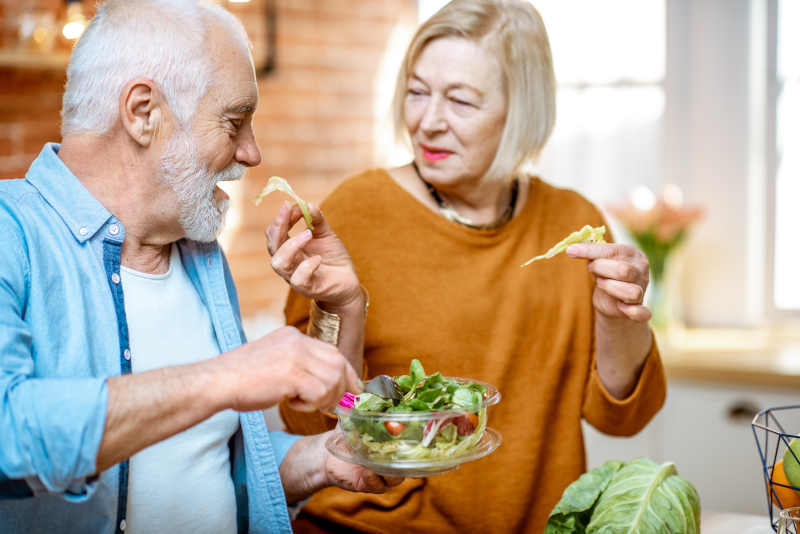Surgery is an intrusive operation, so many individuals are curious about what to eat afterward. Given that proper nutrition will hasten their recovery from surgery, that is a good question for seniors who will be undergoing it. When a senior can resume eating following surgery will depend on the doctor’s advice. The body’s systems will be revitalized and the body’s natural healing process will be sped up by a nutritious diet.
Planning a diet with a wide variety of foods that are rich in vitamins and minerals will aid in tissue healing and promote cell growth. After surgery, senior-friendly meals contains 6–8 glasses of water daily and a diet high in nutrients. These options aid in avoiding some of the typical post-operative issues like dehydration and constipation. Lean protein and meals high in fiber are examples of healthy food for seniors following surgery.
Post-Surgery Recovery Food for Seniors
After surgery, doctors advise seniors to follow a nutritious diet. They must either make meals themselves when they come home or hire someone to do so. Knowing what to eat after surgery to reduce inflammation is crucial.
The following foods are good options if you’re unsure about what to eat following anesthesia-induced surgery:
Milk Kefir: After surgery, doctors typically give elderly patients antibiotics to help avoid infections. Additionally, antibiotics aid in eliminating dangerous bacteria in the digestive tract. Seniors want to steer clear of issues like diarrhea and constipation.
Citrus fruit: When seniors are hurt or under stress, their collagen production drastically decreases. Collagen can be recovered by vitamin C in an aged body. Vitamin C is present in citrus fruits like oranges, lemons, limes, and grapefruits. Citrus fruits can speed up the healing process when added to meals.
Fatty fish: high in healthy fats help the body break down vitamins so they may be utilized more effectively. Cod and salmon from Alaska will help seniors digest food more easily. Omega-e fatty acids, which are found in fatty fish products, also aid in reducing inflammation.
Berries: In the days following surgery, chemicals known as free radicals proliferate and may destroy damaged tissue. Complex chemicals called antioxidants guard against free radicals. Antioxidants are abundant in berries like raspberries, blueberries, and blackberries.
Whole grains: an excellent source of carbs, which are a healthy source of energy and help to develop muscle. Good whole grain options include quinoa, items made from whole wheat, and oats.
Red meat: after surgery, red meat’s amino acids aid in the production of new cells. Red meat is a superb source of nutrient-dense protein, particularly meat from grass-fed cows who haven’t received hormone injections.
Good Foods to Eat to Prevent Constipation
Everyone should include fiber in their diet since it helps to reduce constipation, a common issue following surgery. Constipation can be uncomfortable and increase the likelihood that you’ll need medical care while you’re recovering.
Here are some recommended high-fiber foods to choose from if constipation is something you want to prevent following surgery:
- Whole grain bread
- Corn
- Oatmeal
- Fruits
- Cereals like cream of wheat
Seniors Need to Drink Water to Stay Hydrated.
Replacing lost fluids aids in the body’s ability to recover from surgery in seniors. Water in small amounts is insufficient. To spice up simple drinking water and make it less monotonous, try adding herbs or a squeeze of lemon.
Foods to Steer Clear of for Recovery
Knowing what to avoid eating after surgery is just as crucial as organizing a wholesome post-surgical diet. Constipation is more likely to occur if certain meals are consumed. Constipation can hurt and put stress on an older person’s incision.
The following foods should be avoided:
- Dehydrated and dried foods
- milk and other dairy products
- Cheese
- syrupy and sweet foods
- Loss of Appetite Following Surgery
After surgery, nausea or constipation can sometimes result in an appetite reduction. It is important for elders to eat even if they are not really hungry. Energy-boosting foods that are high in calories include smoothies made with yogurt and fruit. When considering what to eat to lessen nausea, protein drinks are a wonderful option.
Help from Caregivers
At any age, recovering from surgery is stressful, but elderly adults have it particularly hard. Seniors who want to speed the healing process and regain their strength must take great care with their diets.
Our in-home caregivers at St. Bernardine Home Care make sure that elders are receiving the right nourishment following surgery. To care for seniors after surgery and longer if necessary, we offer caregivers who have undergone professional training and certification. Seniors who require in-home care following surgery should contact a caregiver right away.
